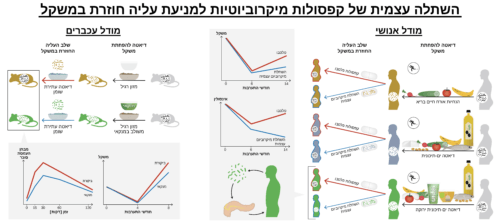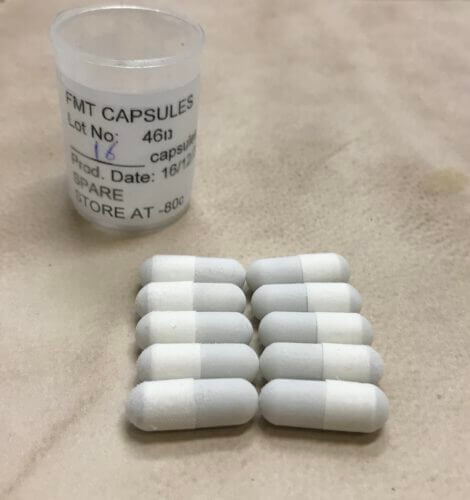A new study conducted at Ben-Gurion University of the Negev in extensive international collaboration has proven that self-implantation of microbiotic capsules containing intestinal bacteria, collected during the weight loss phase, improves the chances of the diet over time. Dozens of Kriya nuclear research workers participated in an experiment that supported the findings

It is known that most weight loss diets reach their peak of success after 4-6 months and then are challenged by partial weight gain again, despite the continuation of the diet. An international group of researchers wanted to check whether reimplantation of a purified microbiome (intestinal bacteria) taken after six months of dieting would help preserve the successful weight loss gains through the preservation of the bacterial memory.
The experiment lasted for 14 months among 90 of the employees of the nuclear research facility in Dimona. The trial participants, who lost an average of 8.3 kilograms after six months, were asked to take 100 frozen capsules over time under the direct supervision of the researchers and did not know whether they were consuming their personal microbiome or placebo capsules. All capsules were identical in appearance, frozen, sealed and odorless.
Personal microbiome transplantation in humans was found to be a safe procedure for 6 months of taking, with no significant side effects. Participants who were randomized to lose weight using a green Mediterranean diet, and were given a daily supply of green tea and the mankai plant, underwent the most striking change in the composition of the gut bacteria during the weight loss phase. In this group, the microbiome capsules moderated the repeated weight gain at the end of 14 months, with 14% of the weight regained compared to 50% in the placebo capsule group. In addition, the frozen microbiotic capsules significantly moderated a repeated increase in waist circumference and even caused a further decrease in the indices of the hormone insulin, which is related to sugar control, compared to the placebo capsule group. The researchers identified specific bacteria they conserved, mainly associated with glucose control.
This study, published these days in the prestigious journal Gastroenterology, was carried out under the leadership of Prof. Iris Shay from Ben-Gurion University of the Negev, together with her PhD student - Ehud Rinot. Dr. Ilan Jungster from the Shamir Medical Center and Tel Aviv University, researchers at the universities of Harvard, Sorbonne, Minnesota, Leipzig, and the Pam Center in Italy participated in the study.

Prof. Iris Shay, expert in clinical trials in nutrition and chronic diseases at Ben-Gurion University and adjunct professor at Harvard University: "This is an opportunity for an innovative application of personalized medicine. The weight loss phase, which manifests itself in an optimal state of the metabolic and hormonal system and mediates changes in the structure and function of our gut bacteria population, is an opportunity to freeze a personal microbiome bank and use it effectively in the future, while continuing to maintain a healthy lifestyle."
Dr. Ilan Jungster, Director of the Unit for Infectious Diseases in Children and the Microbiome Research Center at the Shamir Medical Center: "This study is the first of its kind to prove in humans that the preservation of an 'ideal' microbial composition can be used for a later point in time to achieve metabolic benefits. I believe that the use of autologous microbiota transplantation will also be used in the future to treat other indications."
According to Ehud Rinot, a doctoral and medical student in Prof. Shay's laboratory, "the fact that the gut microbiome is affected by specific nutritional interventions may help us improve the therapeutic effects of microbiome transplantation."
In a complementary animal experiment he conducted Prof. Omri Koren At Bar-Ilan University, a specific effect of the Mankai water plant was identified on the improvement of the microbiome in the weight loss process, an effect that was accompanied by an improvement in the efficiency of the repeated transplantation process and in maintaining weight loss and sugar control.
More of the topic in Hayadan:

5 תגובות
Is it marketed and when can you try it?
If the microbiotics help, then they should look into the possibility of giving thin people microbiotic capsules, because there are also many people who have difficulty getting through the part of the first six months, and it is even more discouraging if you know that there will be a recurrence later...
It is better to focus on those who already have proven success and have managed to maintain a low weight for years and take the microbiotics from them.
God in heaven.
I have no reason to conclude that eating your own shit is better than what is sold in the cafeteria of the nuclear school.
It is written so badly, that after reading the same paragraph in 5 different variations, almost nothing is still clear...
Great article. A link to the source should be provided